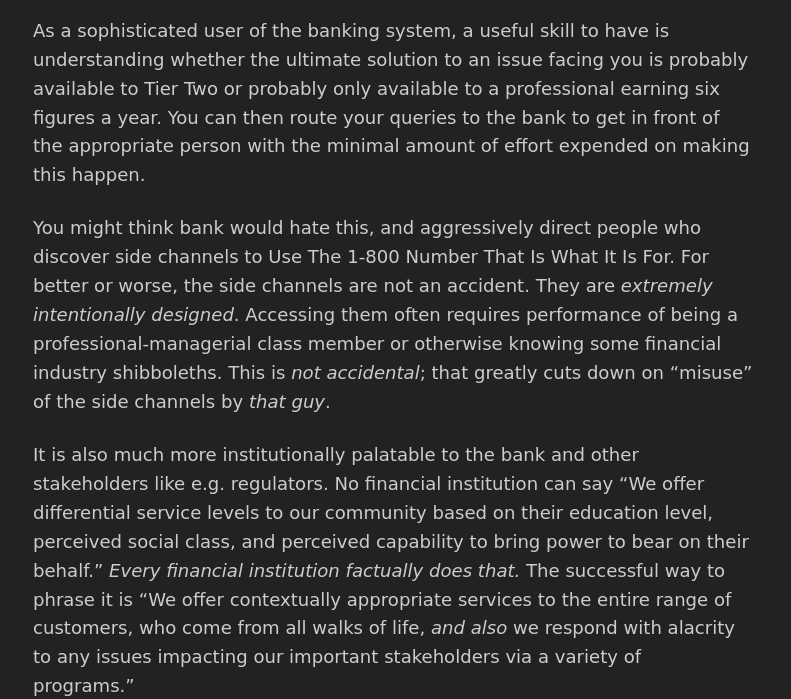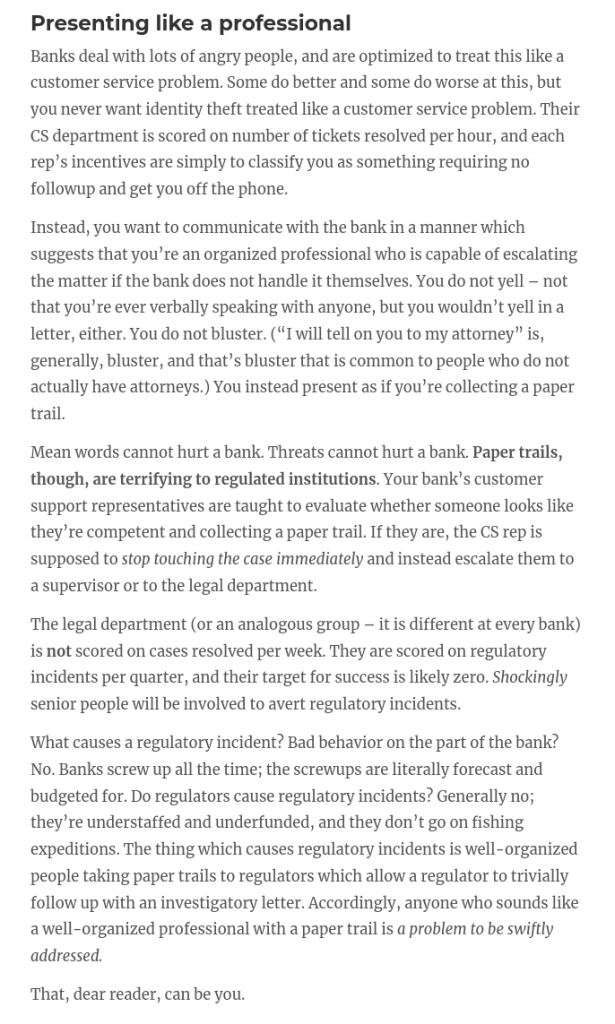Complex systems of life often contain a multitude of shortcuts: sources of alpha which, should you choose to exploit them, give notable advantage. Many classes of these shortcuts are features rather than bugs, and it is no accident of many systems that only a select minority are able to tactfully navigate them.
In many cases there exists zero-sum shortcuts, which, if all of society were to adopt them tomorrow, would have their effectiveness instantly curtailed to zero. Luckily there also exists many which are positive-sum and benefit both parties involved. This post contains a few notes and examples from both classes.
Venture Capital
In venture capital, it is strongly preferred that one receives an introduction to an investor prior to pitching them. This is, in general, a much easier way to meet with many classes of professionals than a cold-email.
At first glance this may appear shallow or nepotistic, but it’s more accurate to view it as one of the first tests to becoming a successful founder. If you’re unable to find any way to get an introduction to a person, it is more likely that you may also have difficulty with other similarly important roles that a founder must perform such as recruiting, sales, management, and further fundraising.
This warm-introduction requirement therefore functions less as “this person happens to know someone”, and more as “this person has the right set of traits in order to acquire this warm introduction, which we consider a modestly bullish investment signal”.
Due to the generality of this phenomenon, this paradigm repeats itself in many categories of society.
Job Hunting
It is much easier to get a job somewhere by messaging someone at that company and asking them to help you out, preferably with some baseline level of evidence that you are at least reasonably competent and aligned with the organization.
This may seem obvious, but at any given moment there are millions of reasonably-intelligent individuals bulk-sending their CVs to hundreds of unsuspecting organizations, when their time may be better spent narrowing their hit list down to only a select few companies, then delegating several hours of their time towards each of them.
You can go much further than this, of course. To give an example: the few times I’ve had an employer other than myself were because I specifically asked to be hired for a role I made up. Rather than seeing an available position on a job posting, I looked at the intersection between the needs of the organization and my own abilities, and proposed that intersection directly to the CEO as my job description. Many find this to be much more agentic than something like “asking the neighbor with overgrown grass if he will pay me $20 to mow it for him”, but the exact same thing is happening in both of these scenarios. Negotiating your salary is in a similar category of actions.
The reason why the above two sections describe intentional shortcuts is because they’re positive-sum. Negative-sum shortcuts are often unintentional (for example, stealing merchandise from a store), and zero-sum shortcuts can be of arbitrary intentionality.
User Support
Many are familiar with the basic techniques of escalating one’s user support channel with a large corporation to an agent which is both more responsive and more capable. Some classes of individuals may formalize this as e.g. “I’d like to speak with your manager”, but there’s often more effective methods depending on your use case. Patrick McKenzie has many good examples among his blog posts, and I’ve included a wonderful excerpt from him on banking and credit reports below.
While the above example is aimed at individuals that have been wronged by large financial institutions, many of the principles apply more generally.

On occasion, when I’ve had a particularly egregious and frustrating issue with a large company, I’ve emailed an executive in the relevant department with concise and kind language explaining the issue, where its alleviation is in the self-interest of my counterparty. This can sometimes be done all the way up to the CEO, but results vary depending on who both parties are, what the issue is, and how it is communicated (this is, however, a skill you can very much learn and perfect).
I’m fortunate to have a twitter account with a large amount of founders and investors in my following, which affords me the luxury of sometimes having CEOs fix issues I complain about. You don’t need a twitter account for this though; there are many executives and engineers that read forums like e.g. Hacker News and will directly respond to the right classes of issues on occasion.
Every Day Life: Flying
If you spend time thinking about the systems you regularly interact with, you can forecast some potential shortcuts by modelling both the incentive structures of the arbitrators of the system as well as the behavior of the average system participant.
Simple example: I fly pretty frequently. I often do things like:
- Changing my seat an hour before takeoff to get two or three seats to myself. Laying down and taking up a full row is a much better experience than first class! This is done by combining 1) last-minute seat selection with 2) picking flight times where the flight is likely to be <80% full (which is unfortunately not a given for an arbitrary itinerary)
- If I’m feeling particularly voracious when flight attendants decide to hand out biscuits, I might ask for three of them. I’ve never had a response of ‘no’ as there’s no reason for them to decline. I never ask for additional pretzels, should my choice of airline condemn me to such a fate.
- If I want to board earlier than my boarding class, this is generally not scrutinized. I don’t abuse this, but sometimes it is simply more convenient both for myself and others (one reason it can be positive-sum is that I’m particularly quick both with my movement and with handling any luggage). Some airlines are okay with you taking up a first-class seat without paying for it, should one be empty.
- Should the airline lose you your flight (or they require a set amount of passengers to switch flights), the compensation offered to is often highly negotiable (as most things in life are!), and can take many forms (flight credits, class upgrades, lodging, etc).
- If you fly frequently in the US you should get TSA pre-checked. The advantage is more “reduces the variance and maximum time through security” rather than “reduces the average time through security”, as the former allows you a significantly more generous grace period. It’s also worth looking into credit card optimization if you travel frequently, but I’ll consider this outside of the scope of this post lest it turns into the equivalent of “they don’t want you to know this but you can bring candy inside of the movie theater”.
Exercise for the reader
Think about a system you regularly interact with and take some time writing down the incentives of the actors within the system. Think about actions which could be taken which are not frequently given as examples to follow, but which nonetheless match the ‘desires’ of the system.
It will be easier to find zero-sum examples in systems which are less heavily-optimized by market structures, e.g. searching for a secret to getting rich by trading derivatives better than anyone else will probably result in disappointment, whereas acquiring multiple snacks while on a flight won’t be a problem. I’d suggest picking something fun which is a quotidian yet mostly unscrutinized part of your daily life.
Try to come up with novel ideas, ideally by writing down things that come to your mind with as few stimuli to distract you as possible. I find this to be a really good exercise both in critical thinking and in agency.
If you enjoyed this post you may like other posts or my Twitter account. Thanks!
